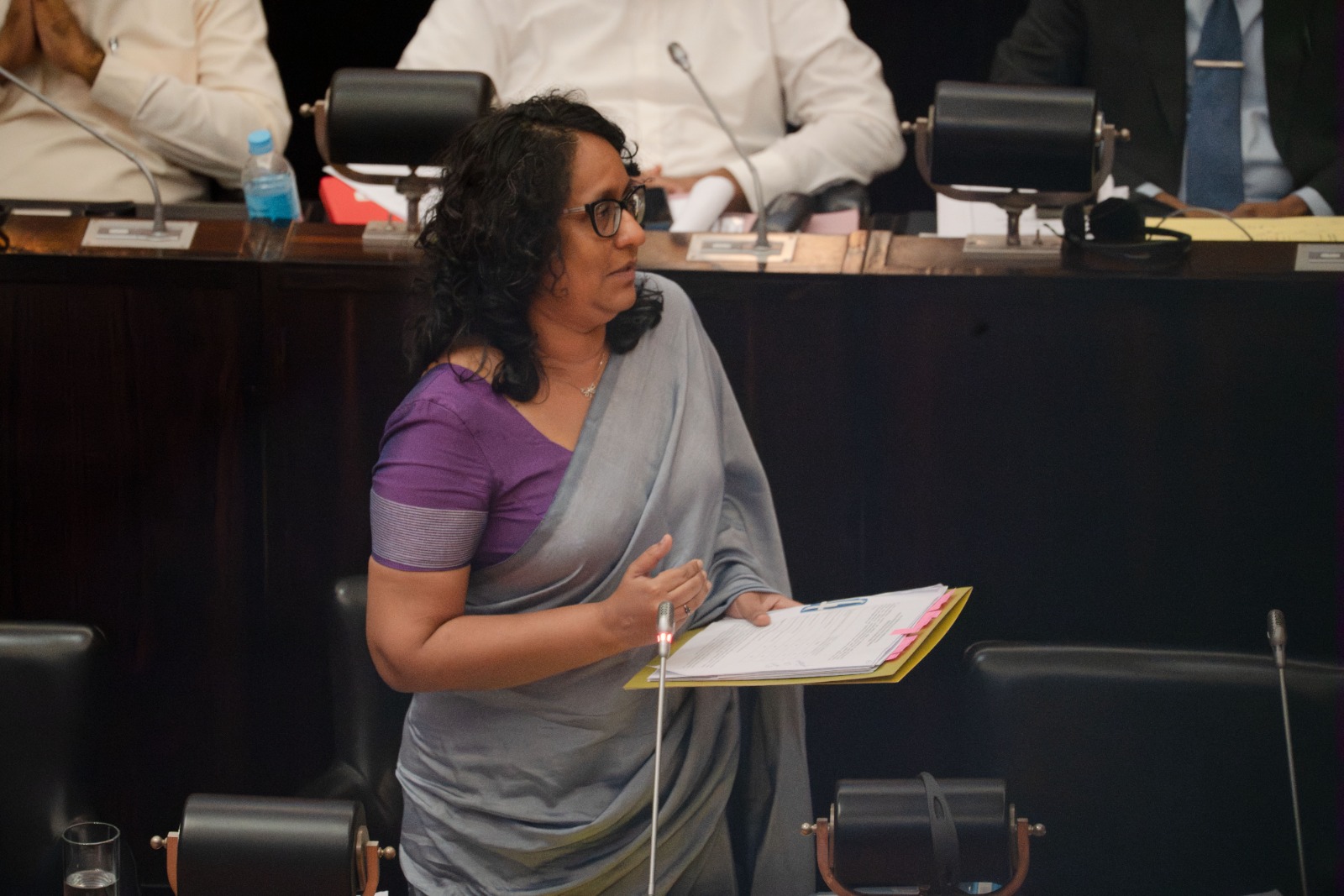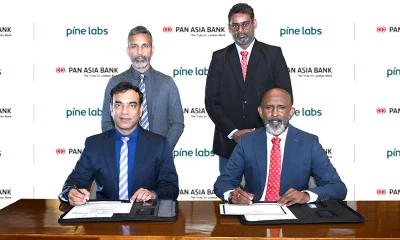News
TISL seeks critical amendments and public consultation on proposed Anti-Corruption Law

Transparency International Sri Lanka (TISL) says that it welcomes the government’s initiative to bring to the forefront the Anti-Corruption Bill that has been in the making for several years. A TISL release said: The Bill (made public at www.tisrilanka.org) contains many laudable provisions that seek to improve upon existing law. TISL notes, however, that no public comments have thus far been incorporated, and remains seriously concerned that what proposes to be a seminal piece of legislation may be rushed through Parliament, with very little room for public intervention on its critical details and implications. With news of the proposed Bill being sent for the Attorney-General’s assent, TISL and several others have provided their comments on the Bill to the Ministry of Justice within the very short period that was indicated. However, it remains unclear whether any public comments on key policy and procedural choices are being considered prior to the Bill being presented in Parliament. This law seeks to replace the Bribery Act, the Commission to Investigate Allegations of Bribery or Corruption Act and the Declaration of Assets and Liabilities law.
While appreciating the need to address the issue of corruption in the country as a priority, TISL notes that Sri Lanka does not lack laws to deal with bribery and corruption even at present. It is the enforcement of these laws that remains woefully inadequate. Law enforcement has demonstrated to be ineffective in prosecuting instances of grand corruption on multiple occasions, where key cases have been discontinued due to technical errors, coupled with deeply problematic withdrawals that have led to critical concerns being raised regarding the independence, resourcing and expertise of law enforcement agencies. It is in this background where Sri Lanka is struggling to effectively and equally apply even the existing anti-corruption laws, that a new Anti-Corruption law is being proposed by the government. TISL seriously notes that the independence of any proposed anti-corruption body from the Executive could only be assured, if any forthcoming Constitutional amendment adequately provides for the same.
TISL’s observations on the Bill includes ensuring that public access to declarations of assets and liabilities is made mandatory, taking steps to prevent the abuse of investigative powers of the proposed Commission, ensuring the independence of the Commission, increasing the penalties, effectively addressing private sector corruption and ensuring that the proposed Commission has the liberty to coordinate with other law enforcement entities and to make information publicly available about the progress of investigations. TISL also notes that the proposed law does not cover significant parts of the United Nations Convention Against Corruption (UNCAC) that Sri Lanka is a party to, such as international asset recovery and the regulation of election campaign finance.
TISL Executive Director Nadishani Perera stated, “It is important that laws are not enacted in a vacuum. They must take into account the context in which they are brought in. Corruption in Sri Lanka cannot be “solved” instantly by law alone. It takes political will, genuine commitment of multisectoral actors, essential systemic reforms and a cultural change to root out corruption from the highest to the lowest level.”
In view of the above, TISL earnestly calls upon the government to prioritise law enforcement, using the existing law to maximum effect against perpetrators of corruption. TISL also calls upon the government to ensure a transparent, consultative process prior to bringing the proposed Anti-Corruption Bill into Parliament at this crucial juncture of the country, in order to gain public ownership and to avoid technical or procedural shortfalls.
News
Stop the collection of funds from parents at school level for Smart Boards — PM

Prime Minister Dr. Harini Amarasuriya stated that the Ministry of Education has already commenced the distribution of Smart Boards required for the new education reforms, and that the collection of funds from parents at school level for this purpose must be stopped immediately. She further emphasized that no decision has been taken to curtail free education or to close the Jayewardenepura Faculty of Dental Sciences.
The Prime Minister made these remarks in response to a question raised in Parliament on Thursday [05th February] by the Leader of the Opposition, Sajith Premadasa.
Elaborating further, the Prime Minister stated,
“Although the Leader of the Opposition has not traditionally upheld free education as a policy, I appreciate your stance on the matter at this juncture. However, I urge that questions should not be raised based on social media content or unverified rumours in Parliament. No decision has been taken to curtail free education or to close the Jayawardenepura Faculty of Dental Sciences. The Medical Faculty of the Wickramarachchi University of Indigenous Medicine had commenced operations without regulatory approval and had introduced course work, resulting in students being placed in a vulnerable situation. Necessary action is currently being taken based on the recommendations of a report submitted by an expert committee appointed to examine the issue. This this is not a political decision, but one guided by expert opinion”.
“Arrangements are underway to distribute the required Smart Boards to schools during this year, and there is no need to collect funds from parents for this purpose. If any such collections are taking place, they must be stopped immediately. The Secretary to the Ministry of Education has already issued a directive instructing schools not to collect funds from parents”.
“The subject Information Technology will not be taught as a separate subject for Grades 1 to 5. However, recognizing the need to prepare students for a globally advancing technological world, discussions have been initiated based on expert advice on how to provide age-appropriate technological awareness to students. Decisions will be made after carefully considering child protection concerns and expert recommendations. The curriculum-related decisions will not be made politically, but by subject experts.
Based on the requests made by the universities and higher education institutions recruitment for essential academic vacancies is currently being carried out under the Cabinet approval. Although thirty years have passed since the establishment of the teacher service, further measures are required to enhance its quality. Existing issues relating to teacher promotions, considering the practical difficulties in evaluation processes and non-compliance with service minute provisions are being addressed alongside other challenges. The government is presently focused on formulating a systematic plan to ensure quality education.”
Responding to a question raised by the Member of Parliament Kader Mastan, the Prime Minister stated,
“Several programmes have been introduced based on government policy decisions to fulfill the basic needs of schoolchildren. These include the provision of school textbooks, uniforms, and the “Suraksha” health insurance scheme. Additionally, voucher schemes have been introduced to support the purchase of sanitary products for girls in Grades 6 to 13. Midday meals are also being provided for primary school students, and financial assistance is extended to students who pass the Grade 5 Scholarship Examination but do not receive bursaries. The Ministry of Education is in the process of gathering further information with the intention of expanding these programmes”.
The Prime Minister also announced that the 2025 G.C.E. Ordinary Level Examination is scheduled to be held from February 17 to 26. Although this period coincides with the observance of Ramadan, relevant authorities have confirmed that it will not pose an obstacle to the conduct of the examination. Furthermore, it has been decided to hold the Grade 5 Scholarship Examination and the G.C.E. Advanced Level Examination before August each year, and the G.C.E. Ordinary Level Examination in December. From 2026 onwards, efforts will be made to conduct examinations in accordance with this revised annual examination calendar.
[Prime Minister’s Media Division]
News
Steps have been taken to modernize Technical Colleges in all 25 Districts – PM

Marking a major transformation in Sri Lanka’s vocational education sector, the Government has decided to develop and modernize 25 technical colleges located across all the 25 districts in line with contemporary global standards.
It was revealed at a special discussion held on 06th of February at the Parliamentary Complex, chaired by the Minister of Education, Higher Education and Vocational Education, Prime Minister Dr. Harini Amarasuriya, together with the Deputy Minister of Vocational Education Nalin Hewage.
Addressing the meeting, the Prime Minister emphasized that these development initiatives should not be limited merely to providing vocational skills, but should also place strong emphasis on the mental health and overall well-being of the youth.
Accordingly, the Prime Minister stressed the importance of establishing modern hostels, cafeterias, and healthcare facilities; designing both internal and external environments in a manner that offers recreational and aesthetic experiences while promoting mental well-being; and developing a distinct identity for each technical college so that they can be clearly recognized as unique institutions, separate from other educational establishments.
Speaking at the discussion, Deputy Minister of Vocational Education Nalin Hewage stated that development work at 23 technical colleges could be commenced in the near future in order to enhance the human resources required for national development. He further noted that it is expected to obtain the labour contribution and assistance of the Tri-Forces for these construction and modernization activities.
The discussion was attended by Deputy Minister of Defence Major General Aruna Jayasekara, Secretary to the Ministry of Defence Air Vice Marshal Sampath Thuyacontha, Secretary to the Ministry of Education Nalaka Kaluwewa, along with the officers from the Tri-Forces.
[Prime Minister’s Media Division]
News
Coal scam has become litmus test for NPP: FSP

The scam involving the import of substandard coal has become the litmus test for the NPP Government, says the Frontline Socialist Party.The substandard coal scam has become the litmus test for the NPP government’s integrity and transparency, Frontline Socialist Party (FSP) Education Secretary Pubudu Jayagoda said on Thursday, alleging serious irregularities and contradictions in the government’s handling of coal procurement for the Lakvijaya Power Plant.
Addressing the media in Colombo, Jayagoda strongly rejected recent statements made by Tilvin Silva, General Secretary of the JVP, during an interview with a state television channel on the ongoing coal tender controversy. He said several of Silva’s claims were factually incorrect and echoed earlier statements made by the Minister of Power and Energy that had already been abandoned after being proven false.
“There are serious inaccuracies in the views expressed by Tilvin Silva. Some of these false points were first raised by the Power Minister a week or two ago, but he stopped repeating them once we produced documentary evidence,” Jayagoda said, adding that the JVP General Secretary appeared to be “not up to date with the facts.”
Jayagoda rejected claims that coal had previously been purchased without calling for tenders from a politician’s company at inflated prices. He said that since the Lakvijaya Power Plant commenced operations in 2008, tenders had been called annually and contracts awarded to the lowest bidder.
He also dismissed assertions that no tenders were called in 2023. “The Power Minister initially made this claim, too, but stopped after we presented the tender advertisements,” Jayagoda said. He questioned contradictory statements made by government representatives, pointing out that while Silva claimed no tender was called in 2023, references to 2023 tender specifications had been publicly cited by Deputy Minister Kumara Jayakody.
“If no tender was called in 2023, how were tender specifications published that year?” Jayagoda asked, describing the claims as mutually contradictory.
According to Jayagoda, tenders were, indeed, called in 2023 and the contract was awarded to Coral Energy. When that company failed to supply coal on time, the supply responsibility was transferred to Black Sand. He further rejected claims that no tenders were called in 2024, explaining that during the bidding process a company named Potentia had offered a lower price than the initial lowest bidder.
“Based on approvals from the Technical Evaluation Committee, the Procurement Committee, the Cabinet, and finally the Attorney General, coal was purchased from the lowest bidder,” he said, adding that any doubts regarding the legality of the process could be investigated through proper legal channels.
However, Jayagoda stressed that the controversy was not merely about whether tenders were called, but about how the process was manipulated. He listed several concerns raised by the FSP from the outset, including a four-month delay in calling for tenders, changes to tender specifications, and the tender period being reduced by half.
“Urgency was cited as the justification for these changes, yet there was a six-week delay in awarding the tender. That clearly shows there was no real urgency,” he said.
Jayagoda also alleged that laboratory reports were concealed when substandard coal shipments were imported, in order to protect the supplying company. He said that despite a contractual clause requiring the tender to be cancelled if two shipments failed quality standards, the government continued with the order. He further accused the authorities of violating the agreement by approving emergency purchases in a way that benefited the supplier.
“The entire process is suspicious,” Jayagoda said. “A Minister will not resign unless they admit to fraud. But it is the responsibility of the President and the government to conduct an independent investigation, determine whether fraud has occurred, and remove the Minister if wrongdoing is established.”
He concluded by reiterating that the coal tender controversy would serve as a decisive test of the government’s commitment to accountability. “This is the litmus test for the integrity and transparency of the government,” Jayagoda said.
-

 Business4 days ago
Business4 days agoSLIM-Kantar People’s Awards 2026 to recognise Sri Lanka’s most trusted brands and personalities
-

 Business6 days ago
Business6 days agoAltair issues over 100+ title deeds post ownership change
-

 Business6 days ago
Business6 days agoSri Lanka opens first country pavilion at London exhibition
-

 Business5 days ago
Business5 days agoAll set for Global Synergy Awards 2026 at Waters Edge
-

 Business4 days ago
Business4 days agoAPI-first card issuing and processing platform for Pan Asia Bank
-

 Business6 days ago
Business6 days agoESOFT UNI Kandy leads the charge in promoting rugby among private universities
-

 Editorial2 days ago
Editorial2 days agoAll’s not well that ends well?
-

 Features2 days ago
Features2 days agoPhew! The heat …





















